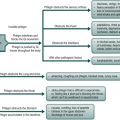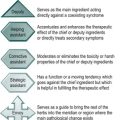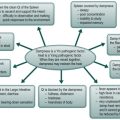9. Syndrome of Liver-Yin deficiency
Manifestations
Main symptoms
Dizziness or chronic lingering headache, blurred vision, dry and tired sensation of the eyes, weakness and stiffness of the joints, especially the knees, irritability, dream-disturbed sleep, tinnitus with a high tone.
Secondary symptoms
Hypochondriac pain, chest pain, epigastric and abdominal distension, a bitter taste in the mouth, heartburn, tiredness, and irregular or scanty menstruation. Some symptoms may exist in stress and emotional situations, such as anger, severe headache, red face, dizziness, vertigo and tingling of the limbs.
Tongue
Red and dry, often with a thin, yellow and dry coating.
Pulse
Thready and wiry; in some cases also rapid.
Associated disorders in western medicine
Hypertension, hepatitis, cirrhosis, peptic ulcer, glaucoma, mental disorders, menopausal syndrome and Parkinson’s disease.
Analysis of the syndrome
The Liver is located in the Lower-Jiao. It belongs to wood in the Five-Element theory. It houses the soul and regulates the Qi movement and the blood circulation. The syndrome of Liver-Yin deficiency is often observed in chronic diseases, people over 50 years old or people with a constitution of Yin deficiency.
• When the Liver-Yin is too weak to nourish its orifice and support the head, the Qi movement and the blood circulation, dizziness, headache, blurred vision and a dry and tired sensation of the eyes may present.
• If the Liver-Yin is too weak to nourish the tendons, the joints become stiff and the knees are weak.
• The Liver-Yin deficiency often follows Liver-blood deficiency. In conditions where Yin and blood are both deficient, they are unable to house the soul, to spread the Qi and to regulate the blood, dream-disturbed sleep, depression, irregular menstruation and tiredness may arise.
Liver-Yin deficiency may bring about the following consequences:
• First of all, Qi stagnation shows in pain and distension of the hypochondriac regions, chest and abdomen. It also shows in changes of mood and irritability.
• Second, Yin deficiency and Qi stagnation may produce heat, which is manifested as a bitter taste in the mouth, heartburn and a quick temper.
• Third, Yin deficiency may trigger a tendency of Yang ascending that causes severe headache, a red face, dizziness, vertigo and tingling of the limbs. If the condition is not treated in time, it may develop into Liver-wind syndrome.
• A red and dry tongue with a thin and yellow coating indicates Yin deficiency with heat. A thready, wiry and rapid pulse represents Yin deficiency with stagnation of Qi and heat.
Treatment principle: Tonify the Liver-Yin
Herb selection principles and formula composition strategies
• First, herbs that enter the Liver and Kidney meridians and are able to nourish the Liver-Yin and tonify the Liver-blood or Kidney-essence are selected.
• Second, herbs that enter the Liver and Kidney meridians, and are able to relax the tendons are selected, along with herbs that reduce the Liver heat and descend the Liver-Yang.
• Third, herbs that regulate the Liver-Qi are selected.
Structure of the formula and selection of herbs
Chief: Nourish the Liver-Yin
E Jiao ( Asini corii colla)
E Jiao is sweet and neutral, and enters the Liver and Kidney meridians. It is able to tonify the Liver-blood and the Kidney-essence. This substance is moistening in nature and can nourish the Yin as well as moisten the dryness. It is particularly suitable for use where the Yin, blood and essence are all deficient, which manifests as dry skin, cracked nails, lusterless hair, scanty menstruation and constipation.
Gou Qi Zi ( Lycii fructus)
Gou Qi Zi is sweet and neutral, and enters the Liver, Kidney and Lung meridians. It is able to tonify the Yin, the essence and the blood. It is particularly selected in the formula to treat eye problems due to Yin and essence deficiency, such as dry and tired eyes, blurred vision and decreased vision.
Bai Shao Yao ( Paeoniae radix lactiflora)
Bai Shao Yao is bitter, sour and slightly cold, and enters the Liver and Spleen meridians. It is able to nourish the Yin and therefore soften the Liver. In addition, it can reduce the empty-heat from the Liver, which is often caused by Yin deficiency. Thus it is considered an effective herb to soften and pacify the Liver, and is used to treat cramping pain due to Yin deficiency that fails to nourish the tendons and muscles. It is also selected in emotional disturbances such as stress, anger, frustration, resentment and irritability.
Nu Zhen Zi ( Ligustri lucidi fructus)
Nu Zhen Zi is sweet, cold and bitter, and enters the Liver and Kidney meridians. The characteristic of this herb is that it can nourish the Yin and reduce the empty-heat without any cloying side effect, which arises in many of the herbs that nourish the Yin. It is particularly suitable for use in the formula for patients who suffer from Yin deficiency when the Stomach is too weak to bear the heavy herbs. It is often used for heavy menstruation in the menopause due to empty-heat in the Liver and Kidney meridians and organs. It is also selected in formulas to treat dry eyes, blurred vision and tinnitus.
Deputy: Nourish the Kidney-Yin in order to tonify the Liver-Yin
Shu Di Huang ( Rehmanniae radix praeparata)
Shu Di Huang is sweet and slightly warm, and enters the Kidney and Liver meridians. It is a strong herb for tonifying the essence and blood, and can therefore nourish the Yin vigorously. It is often used in conditions of Liver-Yin deficiency where blood deficiency arises at the same time. As this herb is rich and cloying in nature and may bring an extra burden to the Stomach, herbs that promote Qi movement in the Middle-Jiao are required.
He Shou Wu ( Polygoni multiflori radix)
He Shou Wu works in a similar fashion to Shu Di Huang in enhancing the function of nourishing the Liver-Yin. The strong point of this herb is that it does not have a cloying nature like Shu Di Huang, and thus can be applied to patients who have a weak stomach.
Shan Zhu Yu ( Corni fructus)
Shan Zhu Yu is sweet, sour and warm, and enters the Liver and Kidney meridians. The characteristic of this herb in the aspect of nourishing the Yin is that it is able to tonify as well as stabilize the Yin. It is particularly selected in the formula to treat spontaneous sweating and night sweats, heavy menstruation, dry eyes and cramping pain due to Yin deficiency.
Assistant: Open the meridians and collaterals, relax the tendons, reduce the Liver-heat, descend the Liver-Yang and spread the Liver-Qi
Ji Xue Teng ( Spatholobi caulis et radix)
Ji Xue Teng is bitter, sweet and warm, and enters the Liver and Kidney meridians. It can tonify the blood, promote blood circulation and open the collaterals. It is often selected in the formula to treat numbness of the limbs, and stiff and uneasy sensations of the muscles and tendons.
Sang Ji Sheng ( Taxilli herba)
Sang Ji Sheng is bitter, sweet and neutral, and enters the Liver and Kidney meridians. It can nourish the blood, strengthen the tendons and expel the wind-dampness. It is particularly useful for recurrent or chronic muscular disorders, such as chronic stiffness and heaviness of muscles in a condition of Liver-Yin and blood deficiency.
Gou Teng ( Uncariae ramulus cum uncis)
Gou Teng is sweet and slightly cold, and enters the Liver meridian. It can clear the Liver-heat, calm the Liver and is particularly suitable for use in conditions where excess heat injures the Liver-Yin. The main symptoms are fever, convulsions, irritability and restless sleep.
Mu Dan Pi ( Moutan cortex)
Mu Dan Pi is bitter, pungent and slightly cold, and enters the Heart, Liver and Kidney meridians. It is particularly selected in the formula to cool the blood, reduce the empty-heat, dissolve the congealed blood and invigorate the blood. It is used when there are symptoms such as low-grade fever, warm palms and soles, heavy menstruation due to the heat in the blood, or amenorrhea due to Liver-Yin deficiency with stagnation of the blood.
Bie Jia ( Trionycis carapax)**
Bie Jia is salty and cold, and enters the Liver meridians. It is able to nourish the Yin and reduce empty-heat, and is particularly selected in the formula to treat severe warm palms and soles, bone steaming and night sweats due to severe Yin deficiency with ascending of the Yang and heat of the Liver. As use of this substance is now forbidden, a substitute is recommended.
Yu Jin ( Curcumae radix)
Yu Jin is pungent, bitter and cold, and enters the Liver, Heart and Lung meridians. It can promote the Qi movement and blood circulation. It is suitable for treating tenderness of the breasts, hypochondriac pain and distension, irritability and irregular menstruation in the condition of Liver-Yin deficiency with Liver-Qi and blood stagnation.
Xia Ku Cao ( Prunellae spica)
Xia Ku Cao is pungent, bitter and cold, and enters the Liver meridian. This herb is able to spread the Liver-Qi and reduce the heat. It is mainly used to treat disorders of the eyes caused by Liver-heat, such as distending pain of the eyes, red eyes and dizziness; thus it is often used in treating hypertension and glaucoma. This herb is also able to dissipate clumps and nodules, and to treat painful breasts caused by obstruction of Liver-Qi by condensed phlegm, such as in chronic cystic mastopathy.
Envoy: Harmonize the herbs in the formula
Zhi Gan Cao ( Glycyrrhizae radix preparata)
Zhi Gan Cao is sweet and moist in nature. It can moisten the Liver-Yin and soothe the Liver-Qi. In addition, its sweet nature can harmonize the herbs in the formula.
Common accompanying symptoms and treatment
• Liver-Yin deficiency with blood stagnation: use Yu Jin ( Curcumae radix) and Mu Dan Pi ( Moutan cortex) to promote blood circulation.
• Obvious headache and dizziness: add Ju Hua ( Chrysanthemi flos) and Bo He ( Menthae herba) to clear the heat in the head and regulate the Qi there.
• Blurred vision and reduced vision: use Gou Qi Zi ( Lycii fructus), Nu Zhen Zi ( Ligustri lucidi fructus) and Mi Meng Hua ( Buddlejae flos) to improve vision.
Examples of classical formulas
Bu Gan Tang (Tonify the Liver Decoction) 
Source: Yi Zong Jin Jian 
Composition
Dang Gui ( Angelicae sinensis radix) 9 g
Bai Shao Yao ( Paeoniae radix lactiflora) 12 g
Chuan Xiong ( Chuanxiong rhizoma) 9 g
Shu Di Huang ( Rehmanniae radix praeparata) 12 g
Suan Zao Ren ( Ziziphi spinosae semen) 9 g
Mu Gua ( Chaenomelis fructus) 9 g
Mai Men Dong ( Ophiopogonis radix) 12 g
Zhi Gan Cao ( Glycyrrhizae radix preparata) 6 g
Dosages are added, as they were not recorded in the source book.
Analysis of the formula
Generally speaking, blood, Yin and essence all belong to the Yin because of their substantial form. In a syndrome of Liver-Yin deficiency, Liver-blood deficiency is often the initial stage of Liver-Yin deficiency; liquid-Yin deficiency is the second stage, and essence deficiency of the Liver and Kidney is the last stage. Thus, to tonify the Liver-Yin, herbs that tonify the blood and nourish the liquid-Yin and the essence are all selected.
In this formula:
• Dan Gui, Bai Shao Yao, Chuan Xiong and Shu Di Huang are used as chief. These herbs comprise the principal formula of tonifying the blood, Si Wu Tang (Four-Substance Decoction). They enter the Liver and Kidney meridians, tonify the blood and Kidney-essence, and form the main part of the formula.
• Suan Zao Ren is able to nourish the blood, calm the mind and thus improve sleep. Mai Men Dong can nourish the liquid-Yin. Mu Gua can stabilize the Yin and relax the tendons, and is often used to relieve cramp of the muscles. They are used as assistants.
• Zhi Gan Cao, as envoy, harmonizes the herbs in the formula.
Commentary on strategies
In this formula, there are only a few herbs to nourish the liquid-Yin and the essence directly.
• Sour herbs are used to stabilize the Yin, such as Bai Shao Yao, Mu Gua and Suan Zao Ren.
• Cold Mai Men Dong and sweet Zhi Gan Cao can generate the Yin.
• Herbs that tonify the blood form the main part of this formula, indicating the close relationship between the Yin and blood of the Liver. This also suggests that this formula is particularly suitable to be applied at the initial and second stages of Liver-Yin deficiency, which manifest as dizziness, blurred vision or decreased vision, numbness and tingling of the limbs, and cramp of the muscles. A red, dry tongue and a wiry, thready pulse are often observed in this condition.
Zi Shui Qing Gan Yin (Nourishing the Water and Clearing the Liver Decoction) 
Source: Gao Gu Feng’s formula 
Composition
Sheng Di Huang ( Rehmanniae radix) 24 g
Shan Zhu Yu ( Corni fructus) 12 g
Shan Yao ( Dioscoreae rhizoma) 18 g
Fu Ling ( Poria) 12 g
Ze Xie ( Alismatis rhizoma) 6 g
Mu Dan Pi ( Moutan cortex) 9 g
Dang Gui ( Angelicae sinensis radix) 9 g
Bai Shao Yao ( Paeoniae radix lactiflora) 30 g
Chai Hu ( Bupleuri radix) 12 g
Zhi Zi ( Gardeniae fructus) 9 g
Da Zao ( Jujubae fructus) 4 pieces
Analysis of the formula
This is a formula devised for treating Liver-Yin deficiency with empty-heat and stagnation of the Liver-Qi. The symptoms are dizziness, tinnitus, hot flushes, irritability, palpitations and irregular menstruation. The tongue is red without coating and the pulse is thready, wiry and rapid. These symptoms indicate that the Yin of the Liver is seriously consumed, and is no longer able to hold the Yang. Moreover, the Kidney-Yin is also injured at the time of Liver-Yin deficiency.
This formula can be considered a variation of the principal formula that tonifies the Yin, Liu Wei Di Huang Wan (Six-Ingredient Pill with Rehmannia), which consists of three pairs of tonifying and reducing herbs that nourish the Yin of the Kidney, Liver and Spleen respectively.
In Liu Wei Di Huang Wan:
• The first pair is Shu Di Huang and Ze Xie. Shu Di Huang tonifies the Kidney-Yin and Ze Xie reduces the turbid dampness from the Kidney to assist the function of Shu Di Huang.
• The second pair is Shan Zhu Yu and Mu Dan Pi. Shan Zhu Yu nourishes and stabilizes the Liver-Yin, and Mu Dan Pi may reduce the empty-heat from the Liver, thus assisting the function of Shan Zhu Yu.
• The third pair is Shan Yao and Fu Ling. Shan Yao nourishes and stabilizes the Spleen-Yin, and Fu Ling is able to drain out the dampness from the Spleen.
The formula accentuates the tonifying functions, and large dosages are applied in the tonifying herbs. The smaller dosages of reducing herbs serve as assistants to reduce the side effects of the tonifying herbs and to treat the secondary symptoms in the syndrome. This formula is therefore well known due to its thoughtful combinations and its balanced structure.
In this formula, variation is made from the above formula:
• Shu Di Huang, which is warm and mainly tonifies the essence, is replaced by Sheng Di Huang, which can reduce empty-heat, cool the blood and nourish the Kidney-Yin. Therefore the assistants Ze Xie and Mu Dan Pi are used in low dosage.
• Moreover, Dang Gui, Da Zao and Bai Shao Yao are used in the formula to directly tonify the blood. Bai Shao Yao is used in large dosage to enhance the ability of Sheng Di Huang to nourish the Yin and reduce the heat of the Liver.
• Zhi Zi is used to reduce the excess heat from the Heart and Liver caused by stagnation of the Liver-Qi.
• Chai Hu is used to spread the Liver-Qi directly.
Commentary on strategies
• This variation of Liu Wei Di Huang Wan (Six-Ingredient Pill with Rehmannia) indicates that this formula focuses on nourishing the Liver-Yin and Kidney-Yin, reducing heat and spreading the Liver-Qi instead of only nourishing the Kidney-Yin.
• When all the herbs are used together, the Kidney-Yin and Liver-Yin are sufficient and are able to control the heat.
• In addition, when the Liver has sufficient blood and Yin, the Qi can also move smoothly.




